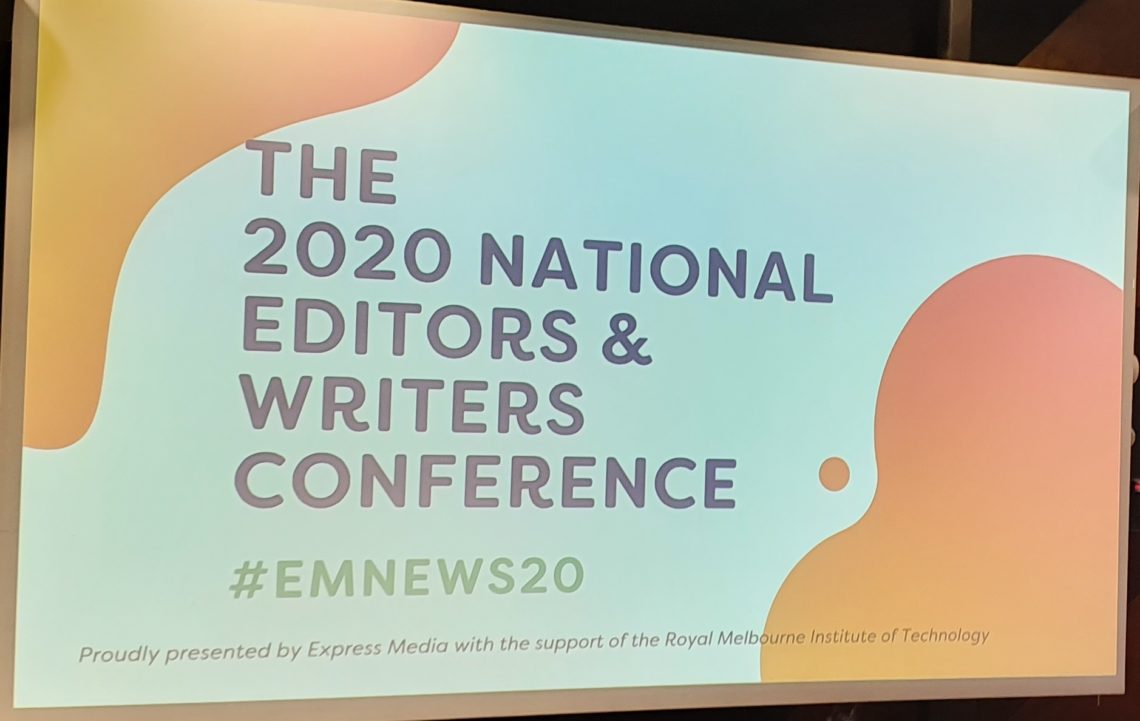
2020 National Editors and Writers (NEWS) Conference
On 27th and 28th January this year, I had the chance to attend the 2020 National Editors and Writers (NEWS) Conference, presented by Express Media at RMIT Melbourne.
This annual two day event brings together writers, editors and student publishers from around the country, for a jam-packed schedule of workshops on professional development, presentations and panels discussing all things editing, media and publishing.
Some of the magazines in attendance included Farrago (University of Melbourne), Voiceworks (Express Media), Westerly (UWA), Pelican (UWA), Rabelais Magazine (Latrobe Uni), KOS Magazine, Wordly Magazine (Deakin), Woroni (ANU) and GLASS (QUT).
It was great to meet and hang out with like-minded word nerds and editors, compare notes, swap stories and also learn from some of the best in the industry.
Day One
Opening Address – Media Futures

Day One’s line-up kicked off with welcoming address from Express Media’s Bethany Atkinson-Quinton, then opening address from Daniel James (Crikey, SBS, and IndigenousX).
‘What does the media future of Australia look like?’ asked Daniel. ‘Honestly, who knows? All I know is big change is afoot.’
He spoke about January’s tense media climate in the lead-up to Australia Day/ Invasion Day – and the influence that Australia’s biggest media companies, like NewsCorp (Rupert Murdoch), Nine (who now own Fairfax), ABC and SBS, can all have on our opinions, world view and democracy through their reporting.
He also spoke about the distrust in social media through manipulating our world view and pushing people’s prejudices (as witnessed through the US election of Trump) – and noted that ‘there’s never been a more critical time to be a critical thinker.’
‘We now choose how we want to digest media and when we want to digest it,’ Daniel said, adding that change comes ‘when consuming turns to conversation,’ bringing about a shift in the way things are reported, therefore influencing our cultural identity. ‘The culture around Australia Day is changing because we are not just having a conversation, we have opened ourselves up to self-reflection.’
He cautioned us as student editors to remain vigilant in the way we tell our stories, and to find our voice – that writing and editing needs to lead to ACTION, and therefore ‘a socially adhesive Australia.’
Breaking: Reporting 101
In our next session, Osman Faruqi (Schwartz Media) spoke about the importance of journalism and breaking news stories.
‘A huge part of journalism,’ he said, ‘is helping people understand the world. It’s not just hey, this thing happened, it’s why this happened and why that matters’ … that ‘the job of journalism is not just to take statements and publish them, but also to find out what’s really happening.’
This was then followed by a very sobering session on Media Law & Ethics with Dr Josie Vine (RMIT) – covering all the nitty gritties of defamation, copyright law, and how not to be sued!
‘I never wanted to be a lawyer,’ said Josie, ‘I just know enough to keep me out of court’ – cautioning us that Australia is the ONLY Western nation that doesn’t have protection for journalists (see Your Right to Know), and to be mindful of our responsibilities as writers, editors and publishers.

Image: Connor O’Brien, courtesy of Express Media
Arts Reviews & Criticism
Afterwards we had a session with arts reviewer Andy Butler, who spoke about the importance of art in reflecting our culture and values. What does the artwork, and our response to it, say about society?
He also explained how a good arts review helps us to archive and track what’s going on, and also bring important works to attention for greater awareness and discussion.
‘The thing I love about arts criticism,’ said Andy, ‘is that you don’t need all the answers. You just need a framework to ask the difficult, deep and critical questions.’
He also cautioned us to ‘be aware of the limits of your perspective’ when reviewing art – and think about the unique angle that you can bring to an arts review. Am I the right person to talk about this, and what can I bring to this?
How to Herd Cats – Managing a Team
The day then wrapped up with a session with Lucy Hamilton of Express Media, talking about how to handle conflict, stress, self-care and your team’s skills, strengths and weaknesses in order to keep your publication running smoothly… all complete with examples in the form of Lion King, Friends, Gilmore Girls and The Office memes!
Day Two
Opening Address – Editing as an exploration and celebration of a culture
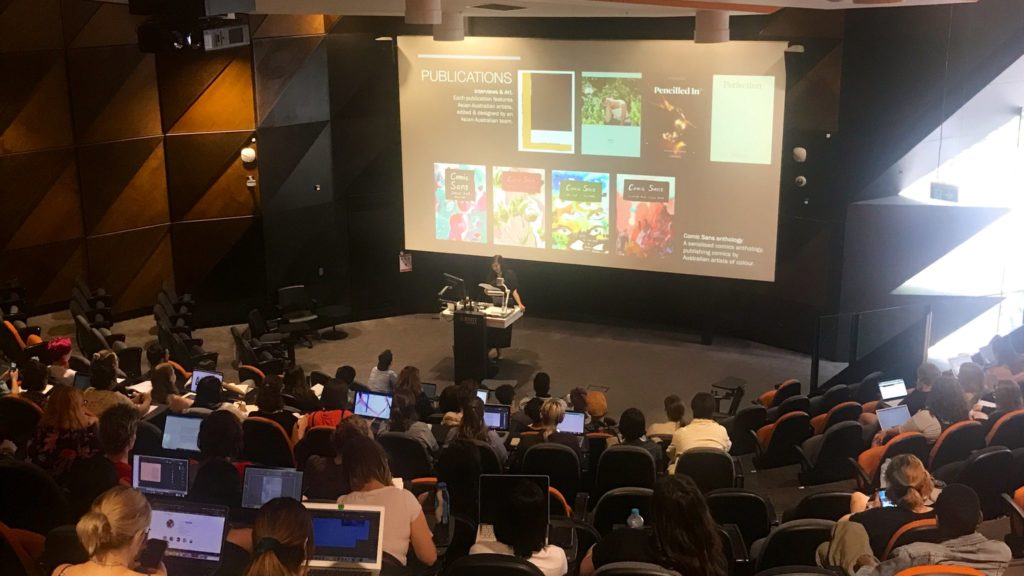
Day Two kicked off with some ‘Literary Speed Dating’ (gah, nerve-wracking!), before the day’s opening address from Leah Jing McIntosh (Liminal Magazine).
Liminal is an online publication that celebrates the Asian-Australian experience. Editor Leah discussed how by curating and editing a magazine, you can celebrate a culture and bring together a community – setting up the magazine to tackle culture wars and identity politics.
‘Liminal is my attempt to immobilise against these forces,’ she said.
Leah had been living in Bloomsbury, London, as an Asian-Australian student surrounded by white colonial people, leaving her to feel isolated, hopeless and wondering why certain voices were left out of discussions.
It wasn’t until she encountered a BuzzFeed article by Jenny Zhang – They Pretend to Be Us While Pretending We Don’t Exist – that Leah started to see how good writing and editing can shift horizons, and provide a new framework for seeing the world.
This resonated, and inspired Leah to start the magazine – to create a space for Asian-Australian voices, where their experience would be recognised. After all, ‘You can’t be what you can’t see.’ (Michelle Law)
She returned to Australia amid the controversy surrounding Pauline Hanson – further fuelling the need to create the magazine.
‘Complaint without action is not an option,’ Leah said. ‘When I was growing up, all the media I consumed was white, so my idea of art was very white. From the time that I was 17 until I was 27, we hadn’t had a single non-white editor for the Australian journal publications.’
‘To be visible, and to be visible just the way you are, is a privilege; and I wanted Liminal to act as a way to be visible,’ she said. ‘For the first time, I think we could see ourselves.’
From little things, big things grow. She quotes Maxine Hong Kingston – ‘In a time of destruction, create something’ – and Mother Teresa – ‘We cannot all do great things, but we can do small things with great love.’
Leah also encouraged us to think about what we can do as editors to create spaces where voices can be heard – ‘how can I open the door, reach behind me and bring people up?’
Why is your Mag so sad? It has too many Issues

Next up was Adolfo Aranjuez from Archer, giving a super energetic and entertaining run-down on managing a publication – covering everything from production schedules, deadlines, editorial cycles, style guides, working with designers and sourcing images… the works!
‘We’re not just spell checkers,’ he said, addressing some of the misconceptions about editing.
‘It’s important that we think about how, yes, editors do have a bit of power, but it is also really hard – there is a never-ending to-do list.’
Get with The Times (New Roman)
The rest of the afternoon was spent in workshops on how to engage with audiences online and coming up with a digital strategy (with Jon Tjhia, senior digital editor at the Wheeler Centre), and a crash course/ refresher on the mysteries of InDesign with graphic designer Laura La Rosa.
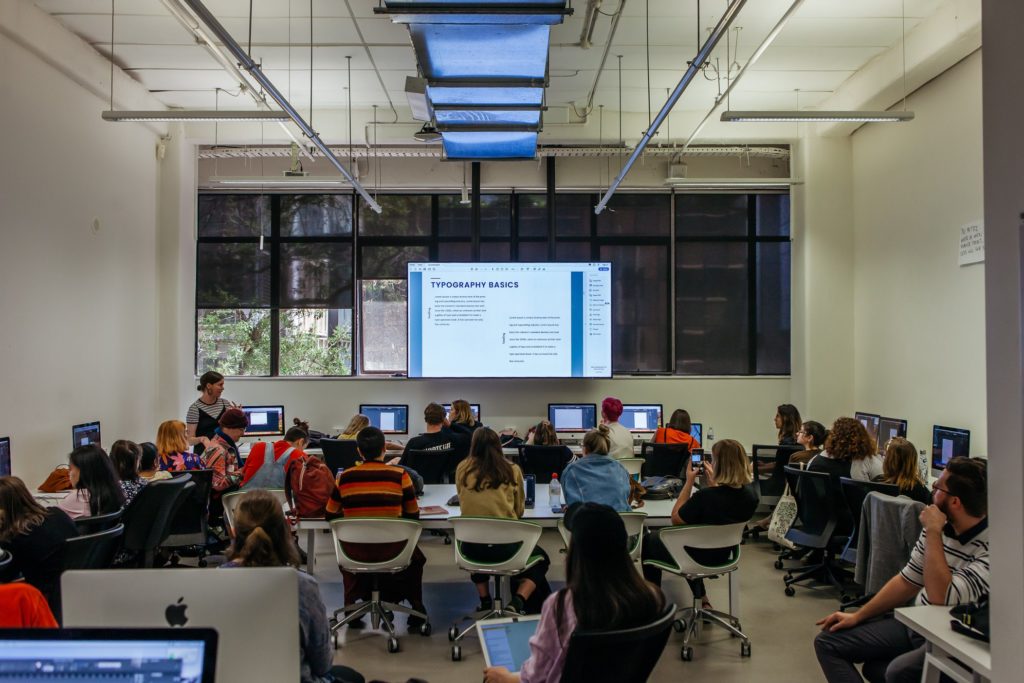
We also got to learn about graphic design from Juliette Younger of Gusher Magazine, a 100% rock magazine that exists to counteract the exclusion of women, made by women for women.
‘We created Gusher as we were sick of the overwhelmingly male-dominated space in rock,’ says Juliette. ‘Feminism is at the core of our magazine.’
Juliette spoke about how it’s important not only to have a clear editorial vision for your magazine, but clear graphic design as well. ‘You can have the best writing in the world, but it won’t be read unless it’s presented well… Image is crucial – it can give further meaning to what you’re reading.’
The day then concluded with afternoon tea with some of the pros: Maddison Connaughton (Saturday Paper), Elizabeth Flux (Ex-Voiceworks), Lujayn Hourani (The Lifted Brow), Zoe Kingsley (Suburban Review), Millie Baylis (Visible Ink) and Mira Schlosberg (Voiceworks).
—
I had to leave early, but what an awesome day!
Both days I came away, head absolutely swimming with ideas and information.
I’m incredibly glad to have had the chance to go along, and learnt so much simply from having been at the conference, soaking things up and getting to meet so many great like-minded people.
Thanks again to Express Media for organising such a great event, and for providing such a great opportunity for young writers to connect and learn from each other.
You can find out more about Express Media and the work that they do here – or follow #EMNEWS20 on Twitter.

Harry Potter Book Night 2020

Storm
You May Also Like
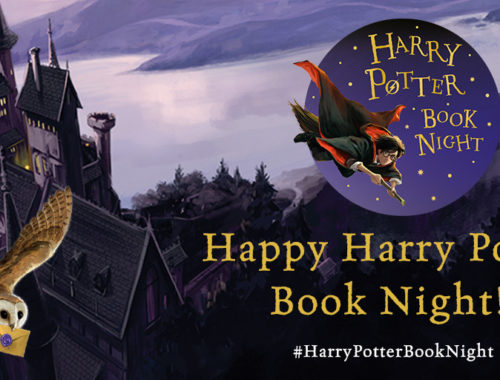
Harry Potter Book Night 2020
February 6, 2020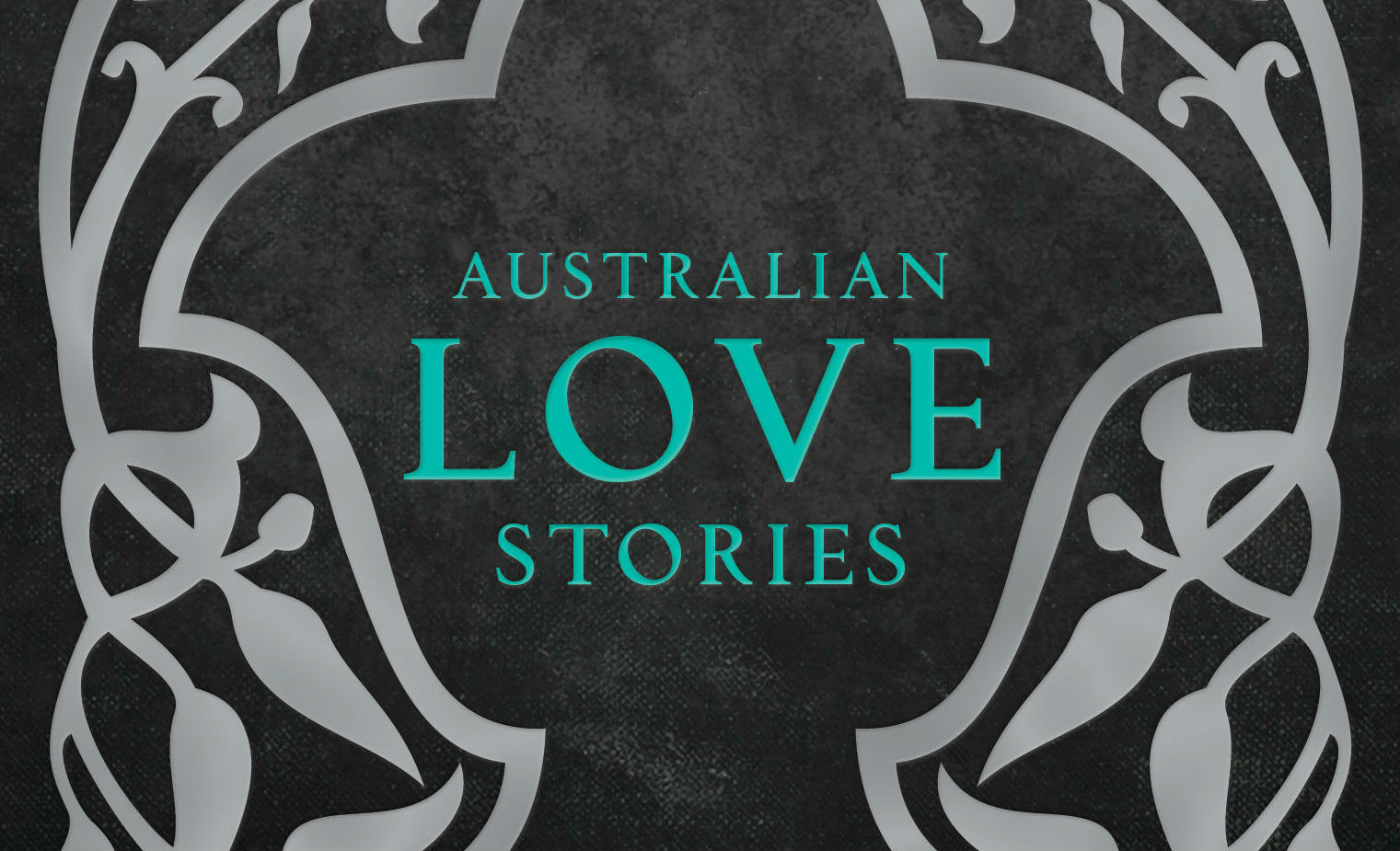
Review: Australian Love Stories, edited by Cate Kennedy
September 29, 2014